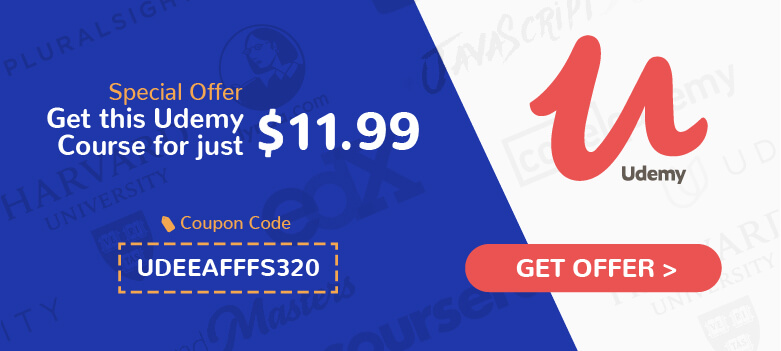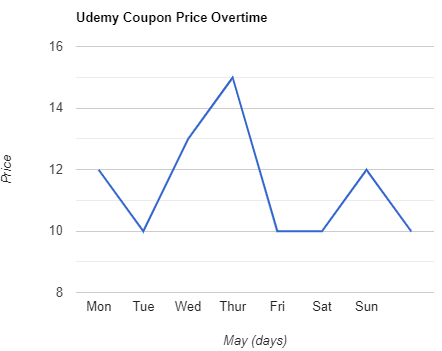The On-Page SEO Guide: Rank Page 1 in Google, Yahoo & Bing (Udemy.com)
The secrets of onpage search engine optimization can be confusing. Now it's easy. SEO for articles, audio, video & more!
Created by: Zach Miller
Produced in 2022
 What you will learn
What you will learn
- You'll know how to perform keyword research for the best terms & phrases (longtail & short) for on-page SEO.
- You'll know how to insert these keywords into your content properly for improving the SEO of your website.
- You'll know how to optimize an article as per SEO guidelines.
- You'll know how to optimize your URLs for improving the SEO.
- You'll know how to create canonical URLs for better rankings/good SEO.
- You'll know how to rank a page of your website Page 1 in Google and maintaining a good SEO score.
 Quality Score
Quality Score
Overall Score : 96 / 100
 Live Chat with CourseDuck's Co-Founder for Help
Live Chat with CourseDuck's Co-Founder for Help
 Course Description
Course Description
This course explains simple SEO techniques to improve the visibility of your web pages for different search engines, especially for Google, Yahoo, and Bing.
If you plan to do some basic SEO, it is essential that you understand how search engines work. In this course, you will learn SEO tactics and methods, website domain, optimized keywords, optimized meta tags, title optimization, optimized anchor, link building and mobile SEO techniques.
---------------------------------------
About the Topic
---------------------------------------
What is On-Page SEO?
On-page SEO is the optimization of the elements that exist on your own website, including content, the code behind every page, visual elements and user experience.
This includes keywords, meta data, HTML code optimization, quality and freshness of content, a good website structure aided by internal linking and a user-friendly interface.
On-Page SEO is usually complemented with Off-Page SEO, which is based on building trustworthy inbound links to your site this is most frequently called linkbuilding.
In terms of ranking potential of these two activities, On-Page is not necessarily more important than Off-Page, but it should come first, since having a good quality website in terms of both content and technical aspects will be the thing that makes others want to link to you in the first place.
It's also a good idea to start your approach to SEO with On-Page because you have much more control of your own website's issues, so you'll be able to eventually start a successful linkbuilding campaign on a website that is well-structured and provides valuable information to its users.
Main Aspects of On-Page SEO
Let's now look at the essential aspects of on-page optimization we'll provide some quick info on all of these elements, but for a more in-depth study you should the dedicated posts for each on-page factor.
Keywords
Whenever you produce a new piece of content for your website, you should already have your main keywords in mind and try to make them stand out on the page.
I've written an entire in-depth article on keyword research on this blog, but in short it means that you should become aware of what people search for in your niche, how they search and how much competition there is for the keywords you may be thinking of targeting.
Depending on the subjects you approach, you may notice that there's tough competition on the most obvious keywords, so you'll have to at least begin by targeting long-tail keywords that will have a lower volume of searches but for which you'll have a better chance of ranking in the SERPs.
After you've built a good presence on long-tail keywords you may increase the probability of ranking for those highly desirable keywords as well.
The most popular way of doing keyword research is by using Google's Keyword Planner tool, which will offer a lot of insight. However, you should know that since it is a tool that's included in Google's AdWords portfolio, it won't provide you with the exact search volume unless you have an active AdWords campaign in which you're spending at least a small amount of money.
The free version of Keyword Planner gives you search volume estimations that are quite broad 1-100, 100-1k, 1k-10k, 10k-100k and so on; it also shows whether there's low, medium or high competition on the keyword.
Keyword Planner isn't the only tool you can use to find keywords. You can find useful information on websites like Moz Keyword Explorer, AnswerThePublic, UberSuggest and others.
Using Your Keywords
You'll certainly want to use your keywords a few times in your text, especially at the beginning of the post and wherever it stands out the most but keep in mind that keyword stuffing will do you no good, and it may even be penalized by the bots if it makes your post sound unnatural.
In order to avoid repeating the same keywords over and over again, you can also use synonyms and context to indicate what your post is about to Google. These are also called LSI keywords (Latent Semantic Indexing).
Meta Tags
Meta data is written so that the search engine's bots are able to understand what your page is about it includes the meta description and the meta title for Google, but Bing and other search engines may use meta keywords as well, so it may be worth it to add them.
Meta Title
The meta title has to include the keyword you're targeting, preferably towards the beginning. It should also invite the user to click on it through a call-to-action or a sense of urgency and enthusiasm.
Many first-page results have numbers in them (e.g. 12 great summer destinations; where to go for Christmas in 2017), because people tend to like reading lists and they appreciate up-to-date content.
Modifiers like how/what/why in the meta title are also useful, since the way people search for things has become increasingly conversational, so it's best to prepare for question-style queries.
Of course, these won't be applicable to websites in all industries and niches, but a lot of them can use this advice.
Experts usually advise that the Meta Title of your page should be no more than 60 characters long, because otherwise it will be cut off in the SERP and it may lower your click-through rate.
However, there have been some who claim that this doesn't have too much of an effect on users, so you won't necessarily lose a lot of clicks because your meta title is a few characters longer, as long as you structure it in a way that makes it pretty clear what the page is about from the first few words.
The point where the search engine cuts off your title may even depend on the specific letters you use and how much space they take up for example, a lot of narrow letters like l' will take up less than capital Ms.
Most content management systems (e.g. WordPress) have an automatic option to add your website's name at the end of each meta title along with a separator (such as or |), so you could also keep that in mind when counting the characters of your meta title if you don't want it to be cut off.
Meta Description
The Meta Description is the small snippet of text that appears under the meta title and the URL in the SERP. Google will extract one from the page automatically if nothing is provided, but you should definitely work on it for each post.
Google claims that the meta description is not a ranking factor and that it's only for the users, but that's not a certainty, and either way, it should be as descriptive and include the main keywords in a natural way.
Meta Descriptions should be around 150-160 characters includi
 Instructor Details
Instructor Details

- 4.8 Rating
 33 Reviews
33 Reviews
Zach Miller
My name is Zach Miller and I've helped double the sales of multiple 6 and 7-figure businesses. How? SALES FUNNELS!
Your core focus should be a sales funnel. That's the cornerstone of a business.
A sales funnel allows you to track your numbers, and number don't lie. In fact, numbers TELL YOU WHAT TO DO. If you split test a page and Page B' performs better than Page A', which page do you keep pushing traffic to?
While sales funnels are my core focus, there's of course more to run a business. That's why I also teach on various topics that I've used in my 10+ years in online marketing: Email Marketing, SEO, WordPress, Video Marketing, and all things entrepreneur and business owner.
MY STUDENT GOALS
100 people become $1,000,000 earners
1,000 people become $100,000 earners
1,000,000 people make $1 online







